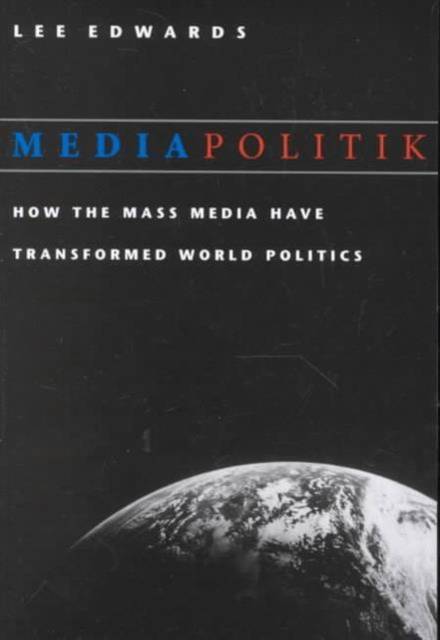
- Retrait gratuit dans votre magasin Club
- 7.000.000 titres dans notre catalogue
- Payer en toute sécurité
- Toujours un magasin près de chez vous
- Retrait gratuit dans votre magasin Club
- 7.000.000 titres dans notre catalogue
- Payer en toute sécurité
- Toujours un magasin près de chez vous
Description
Drawing upon his lifelong study of politics and journalism, political historian Lee Edwards offers the first scholarly examination of a powerful new phenomenon in world politics--the mass media. Edwards argues in his far-ranging and innovative work that the media have become as important a factor in determining the course of international affairs and the future of nations as economic prosperity, military strength, natural resources, and national will. The author calls this vital new component of world politics mediapolitik. He uses case studies from around the world to show how the mass media have influenced and even determined the outcome of major political acts such as the collapse of communism in Eastern and Central Europe, the Tiananmen Square massacre in China, the ousting of Chilean dictator Augusto Pinochet, and the political resurrection of South Africa's Nelson Mandela.
The author argues that these case studies show that the mass media can either enrich or enslave the human spirit, depending upon their moral foundation. If the media follow a liberal democratic model, as in the United States and Western Europe, they contribute to a free and just society. If they follow an authoritarian model, as in South Africa before Mandela, or a totalitarian model as in Saddam Hussein's Iraq or Fidel Castro's Cuba, they perpetuate the regime in power and deny the fruits of freedom and democracy to the people.
Edwards addresses the question of how responsibly the American media, the most influential media in the world, handle their enormous power. Using the results obtained from his survey of 100 leading journalists as well as close analysis of major news stories of the last decade, the author confirms the rampant cynicism of the American media and its deleterious effect on American politics and government. The solution, he suggests, is that American journalists must practice moral responsibility and strengthen the liberal democratic model of mediapolitik around the world.
ABOUT THE AUTHOR:
Lee Edwards is senior fellow at the Heritage Foundation and adjunct associate professor of politics at The Catholic University of America. He is senior editor of The World & I magazine and author or editor of numerous books, including The Collapse of Communism, The Conservative Revolution, The Power of Ideas: The Heritage Foundation at 25 Years, and Goldwater: The Man Who Made a Revolution.
PRAISE FOR THE BOOK:
"Mediapolitik is a broad-gauged survey of what the mass media is, and how it works around the world. . . . There is scarcely an issue or debate within media and media watching circles that Mr. Edwards does not touch on and analyze with care and precision. Reading Mediapolitik is the equivalent of at least a semester's worth of J-School, and more fun."--Washington Times
"Mediapolitik is superb--a much-needed, comprehensive study of a crucial topic. It is full of insight in its analysis and wisdom in its conclusions."--Peter W. Rodman, former Deputy Assistant to the President for National Security Affairs
"A revealing study of the mass media's impact on world politics. You may not agree with all of his conclusions, but Mediapolitik is well worth reading."--Hal Bruno, former political director, ABC News
"Edwards is a sterling advocate for more responsibility in journalism. His cogent insights are always worthy of study and debate."--Stephen Hess, The Brookings Institution, author of The Little Book of Campaign Etiquette
"The author's case studies are valuable. No one, to my knowledge, has presented such information and analysis in such a systematic fashion."--Prof. Marvin Olasky, Acton Institute
"A very plausible and reliable overview of the impact of changes in news and entertainment media on the politics of our world. . . . The
Spécifications
Parties prenantes
- Auteur(s) :
- Editeur:
Contenu
- Nombre de pages :
- 364
- Langue:
- Anglais
Caractéristiques
- EAN:
- 9780813209920
- Date de parution :
- 02-04-01
- Format:
- Livre broché
- Format numérique:
- Trade paperback (VS)
- Dimensions :
- 154 mm x 229 mm
- Poids :
- 603 g







